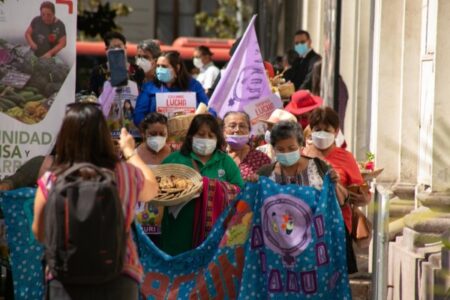At least 600,000 people in Chile face hunger, according to the UN Food and Agriculture Organization’s latest report [1] on the state of food security and nutrition in the world (2021). This is significant in a population of 19.4 million people, and represents an increase of 57,000 people since 2006. Beyond hunger, between 2018-2020, 3.4 million Chilean people faced difficulties accessing healthy and nutritious food. A mere 15% of people over 15 years old get five portions of fruit and vegetables per day. The FAO itself recognised [2] that, besides the impacts of the Covid-19 pandemic, the situation comes as a consequence of vast “inequality” in this South American country.
There has also been a strengthening of the neoliberal aspects of the country’s economic model, which meant an increase in imports of products like sugar, oils, pulses and wheat, to the detriment of local markets and trade for peasant-led agricultural produce.
Within this context, on 20 January, the National Association of Rural and Indigenous Women (ANAMURI), with the support of a member of the Constituent Assembly Alejandra Flores Carlos [3], submitted a proposal for the Right to Food to be incorporated as a fundamental right in the new Chilean Constitution. The initiative, which will be discussed at the 4th Commission of the Constituent Convention, was supported by over 16,500 people who signed a public petition online.
“Dozens of peasants entered the Constituent Assembly on 20 January singing ‘La refalosa del pan [4]‘, a song which goes: ‘From the land comes wheat and from wheat comes bread, and from bread comes the right, the right to eat bread. Long live peasants, who tend it with love, just like those who tend flowers’,” explained Francisca “Pancha” Rodríguez, a historical leader of ANAMURI.
The activity was part of the organisation’s strategy to raise the awareness of Constituent Assembly members regarding the Right to Food, how it is constructed and what it entails.
We interviewed Rodríguez to find out more about the initiative, and what people are doing to highlight the role of peasant and indigenous agriculture and artisanal fisheries in the production of healthy food, the work of women, and the need to save native seeds.
The peoples’ initiative states that in Chile “there are significant inequalities in terms of the quality, quantity and diversity of food consumed, according to the socioeconomic level and geographical residence of each person. The quality of food is reduced in the lowest socioeconomic levels, in the South of the country and in rural areas. The agro-export model has made Chile increasingly dependent in terms of food, with growing levels of imported products in the last 20 years.”
“Food Sovereignty is quite present in the discussion of the new Constitution, but we think the concept needs more depth. That is why our comrade Camila Montecinos went to the commission to submit the initiative and to explain what Food Sovereignty is for peasants, for La Vía Campesina, for CLOC (La Vía Campesina’s regional group in Latin America), to speak about the historic step we took 25 years ago [5] and that today is enshrined in this discussion.”
ANAMURI did not only speak to the members of the Constituent Assembly. To make clear that Food Sovereignty is not just a slogan but a “principle of struggle”, the group also organised urban gardens and other local initiatives to raise awareness among city folk about the construction of this right.
Read the Citizen Constituent Initiative of ANAMURI (in Spanish): “Right to Food, a fundamental and inalienable right of peoples” [6].
We asked Francisca “Pancha” Rodríguez: What are the next steps in the Constituent Assembly? How do you assess the discussion process of the Constituent Convention in these past months?
She explained that: “The process has been rather dramatic and in the coming months we expect to see a stronger offensive from the right wing. This is on top of the persecution and smear campaigns that aim to downgrade the debate and unsettle Constituent members, especially those from grassroots sectors. But now we are expecting an even stronger offensive from right-wing sectors, who have been preparing, with many experts, to discredit grassroots Constituent members. The right-wing is coming to discredit everything that peoples’ initiatives have done.”
“We are in a race against time, because if the new Constitution is not ready by July, then we risk going back to Pinochet’s Constitution. This process took a lot longer than one year and we need to remain vigilant because commissions are already discussing the contents of the Constitution. This has been difficult because, sadly, the rest of the peasant world -except for our comrades at CLOC- depend extensively on what we do. They have appointed us as their ‘speakers’, we carry the voices of the peasant movement, we are meeting with many new ministers, it is exhausting.”
We asked Rodriquez what her expectations are for the new Boric administration, and how this debate will be coordinated by them.
“It is complicated,” she told us. “We don’t want to get our hopes too high. I mean, we clearly know that this will not be easy. The right wing is not giving up, we are not giving up, but neither are they. We have all our determination, awareness and conviction in this struggle; they have all the material resources and perversity.”
They also have a ‘tied’ Parliament in Chile. “The big question is which way the Christian Democracy will go: they didn’t remove any Constituent member and hopefully the right-wing branch of the CD will not succeed.”
Rodríguez celebrated the fact that most ministries are headed by women, but she warned that these are very “controversial” ministries and there can be pressure to judge their “capacities” in a misogynistic way.
“We have to value the fact that the government which will take office is led by young people, who will also have to take into account our country’s history. We have the courage and fearlessness of the youth, and we will succeed,” concluded the peasant leader.
